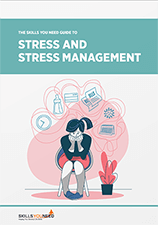5 Smart Tips for Managing Your Anxiety
See also: What is Mindfulness?Anxiety can impact your mind, behavior and body. It is among the most common mental illnesses in the world.
Anxiety disorders can affect a person’s ability to work as well as their personal relationships, and a person suffering from anxiety finds it hard to interact with the people around them. In short, as soon as you identify the red flags, you should start working on managing your stress and anxiety triggers.
Feeling anxious about your work, studies, or relationships is normal. We all feel anxiety at some point in our lives. It is when this anxiety becomes something more than just a temporary condition that there is a problem. For some people, the occasional anxious feelings can transform into chronic anxiety and depression.
The best thing anyone can do is to keep their anxieties from consuming them. Patients may be prescribed medicines by their doctor that are not always helpful. Patients with chronic anxiety cannot spend their entire lives dependent on medications. After a time, these pharmaceutical medicines may begin to do more harm than good. Many people choose to opt for natural remedies or plants such as kratom. You can read golden monk kratom reviews online and discover whether it is suitable for you.
To manage your anxiety, the first thing you need to do is to introduce some serious changes to your lifestyle. You cannot live an unhealthy life and expect all your worries to go away. Even if you continue to take medicines, they may not be able to help you if you do not change your lifestyle. Only you have that power, and that is why you need to take control of the situation.
The best way to keep anxiety at bay is by staying busy doing positive things.
Here are some smart tips for you that will help you manage your anxiety and stress.

1. Make a Plan
Focusing on your diet will not help you if your habits are not healthy. Instead of wasting your free time, use it to build different hobbies and skills. There is always room for you to learn and grow. Dedicate your time to building positive skills.
The best way to follow this rule is by making a plan and then sticking to it. For example, what are your ambitions? What skills have you always wanted to learn? In my case, I have always loved to paint. If I wanted to keep my mind busy, I would make it my goal to learn how to paint and draw!
Setting goals will bring meaning in your life. Identify the skills you need to achieve. These skills can include anything from learning a sport to building communication skills. Find out how you can learn these skills and then start practicing.
2. Healthy Diet

You cannot have a healthy mind without a healthy body and vice versa. You have to make a diet plan that caters to your body and mind both.
The mineral magnesium in food helps your muscles and tissues to relax. A common reason for anxiety, depression and insomnia can be magnesium deficiency in your body. If your intake of vitamin B and calcium is inadequate, this can cause anxiety symptoms. Your daily diet should include foods that are rich in minerals such as leafy green vegetables (they are the best source of iron), wholegrain cereals, and low-fat dairy products. Fermented foods like kimchi, sauerkraut, and some probiotic supplements also contain Lactobacillus probiotic bacteria that have been studied for helping with anxiety through the gut and brain connection.
You should not only add healthy foods to your diet, but you should also eliminate substances that can aggravate anxiety symptoms. Nicotine, caffeine and stimulant drugs trigger your adrenal gland, which then releases adrenaline, one of the main stress hormones. It is best to avoid caffeine, alcohol and junk food as well. Fresh food is always better than processed food with artificial additives.
3. Swimming

If you know how to swim, then you should go for a swim at least two or three times a week (if you cannot do so daily).
Swimming is an effective and fun way to reduce stress. Water itself is used in different hydrotherapies, which proves how soothing it can be. Being in contact with water can help relax your mind and body muscles. A recent study stated that being in water can boost the blood flow to the brain, increasing the supply of oxygen and nutrients.
4. Practice Relaxation Strategies

Relaxation strategies include meditation, yoga, and breathing exercises. You have to learn to relax and let go of things that you cannot control.
You can do breathing exercises anywhere and at any time. Breathing exercises are quite helpful for people who experience panic attacks because of their anxiety as they can help distract your thoughts and focus your attention on the act of breathing.
Doing yoga and meditation regularly will help keep your mind and body calm. People have been practicing yoga and meditation for many centuries. The purpose of these exercises is to be more aware of what is going inside you.
Yoga is a low-risk method for healing your mind and body. You will feel the positive effects even after just one class of yoga. All you need to do is spend ten to fifteen minutes doing this exercise daily, and you will begin to feel calmer in the matter of a few days.
5. Learn Problem-Solving
A lot of times, the main culprit behind anxiety is overthinking.
You begin to think about an issue, and slowly it becomes into this gigantic complication that you cannot wrap your head around. Instead of letting the problem worry you, try to think logically. Can the problem be solved? If yes, then how?
Problem-solving is a useful skill in these situations as, once you begin to find a solution to your problem, you will feel at peace. If you cannot solve the problem, then let it go! There is no point losing sleep over something that you cannot control.
Further Reading from Skills You Need
The Skills You Need Guide to Stress and Stress Management
Understand and Manage Stress in Your Life
Learn more about the nature of stress and how you can effectively cope with stress at work, at home and in life generally. The Skills You Need Guide to Stress and Stress Management eBook covers all you need to know to help you through those stressful times and become more resilient.
Managing your anxiety is related to the way you choose to live your life. A healthy and productive lifestyle will lead to a healthy mind! Stay safe!
About the Author
David Martin is currently a final year student of Neuroscience at California University. He is passionate about writing and takes a keen interest in all things that alter our mental makeup.

